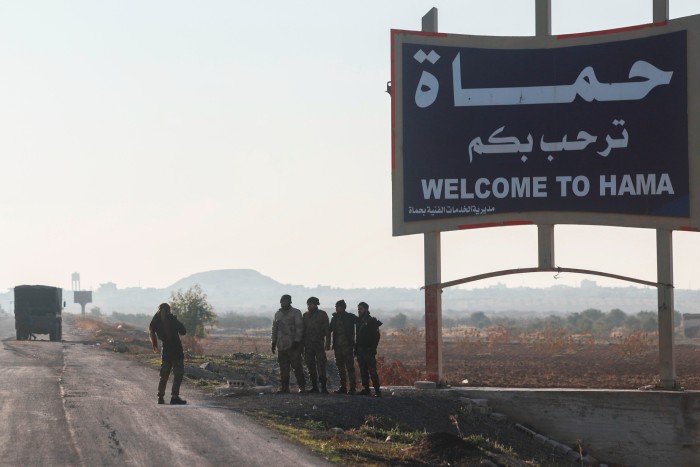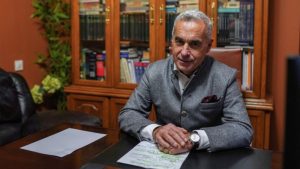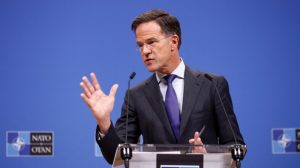Syrian rebels reach outskirts of major city of Hama

Unlock the Editor’s Digest for free
Roula Khalaf, Editor of the FT, selects her favourite stories in this weekly newsletter.
Rebels have reached the outskirts of Hama, one of Syria’s largest cities, dealing another blow to Bashar al-Assad’s regime as it struggles to contain the insurgents’ rapid offensive.
Forces led by Islamist militant group Hayat Tahrir al-Sham said they had seized control of numerous towns and villages on the northern outskirts of the city, despite attempts by the regime units, backed by Russian warplanes, to regroup and push the insurgents back.
The rebels posted pictures with abandoned armoured vehicles and posed with a “Welcome to Hama” sign about 20km outside the city of about 1mn people. They posted a video of their drones attacking regime helicopters at Hama air base, less than 5km from the city centre.
Hama lies south of Aleppo, Syria’s second city, where the rebels seized control over the weekend, days after launching their lightning offensive from their stronghold in the north-west that has become the gravest threat to the Assad government in a decade.
The rebels’ ability to advance on Hama further underscores the fragility of the regime and the weakness of the Syrian army, even though it is propped up by forces from Russia, Iran and Iranian-backed militants.

Syrian state TV quoted a “military source” as saying that reinforcements had arrived in Hama to bolster pro-regime contingents and “confront any attack attempt that may be launched by armed terrorist organisations”.
If the rebels seize control of Hama, it will be the first time the regime has lost control of the city since the civil war erupted after a 2011 popular uprising against Assad.
The offensive has reignited the conflict after several years in which the front lines were largely frozen. Assad had retaken control of much of the country, but he presides over a broken, bankrupt state. Disillusionment and anger have intensified among Syrians, including those who once supported his regime.
HTS is the most powerful Syrian rebel faction, and was once an affiliate of al-Qaeda. But in recent years its leader, Abu Mohammad al-Jolani, has sought to rebrand the group as a more moderate Islamist force while controlling Idlib province in the north-west of the country and building up its military capacity.
The group is also co-ordinating with Turkish-backed factions based in northern Syria, but the extent of their role in the fighting is unclear, analysts say.
Moscow and Tehran have both pledged to support Assad, with Russian and Syrian war planes in recent days carrying out multiple air strikes on Idlib, which is home to 3mn-4mn people, as well as on rebel positions in Hama and Aleppo.
The UN said civilians had been killed in attacks by both rebel and government forces since the offensive began, while thousands of people have been displaced across the north of the country.
Iranian foreign minister Abbas Araghchi told the Qatari-owned Al-Araby Al-Jadeed news outlet on Tuesday: “If the Syrian government asks Iran to send forces to Syria, we will consider the request.”
Scores of Iranian-backed Shia militia members have already crossed into Syria from Iraq to support Assad, said an Iraqi militia official.
The head of Iraq’s Popular Mobilization Forces, a state security force that brings together Iraq’s largest Shia militia factions, denied that any of its members had gone to Syria.
On Tuesday, Iraqi Prime Minister Mohammad Shia’ al-Sudani said Baghdad would not be a “mere spectator” in Syria, without elaborating.
The threat to Assad’s hold over the country comes as Russia has been distracted by its war in Ukraine, while Iran and the Lebanese militant movement Hizbollah, its most powerful proxy, have been locked in conflict with Israel.
The foreign ministers of Russia, Iran and Turkey are expected to hold talks on the crisis over the weekend in Qatar. The three key foreign actors in Syria have previously thrashed out local ceasefire arrangements and de-escalation deals during the civil war.
But Assad has repeatedly refused to engage with the Syrian opposition to negotiate a settlement.
Complicating matters for Damascus, the pullback of regime forces in northern Syria has allowed other forces to challenge government troops for territory.
Kurdish forces, which control broad areas of north-east Syria and are backed by the US as part of the fight against Isis, said on Tuesday they had taken over a handful of areas formerly under regime control. Syrian state TV said that government forces and their allies were repelling the assault.
Cartography by Steven Bernard
#Syrian #rebels #reach #outskirts #major #city #Hama







